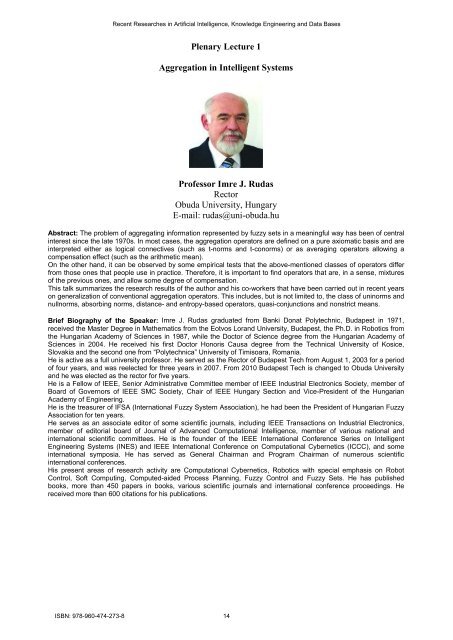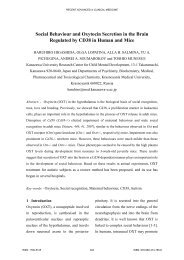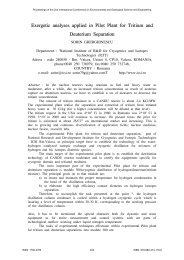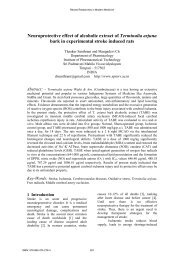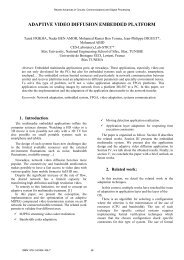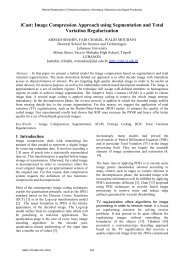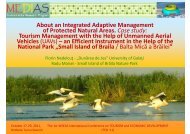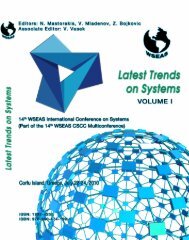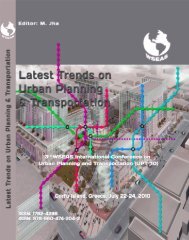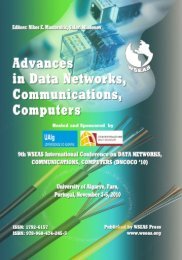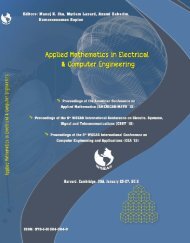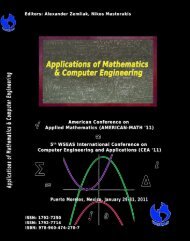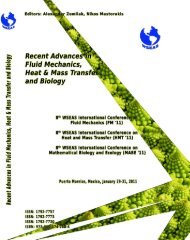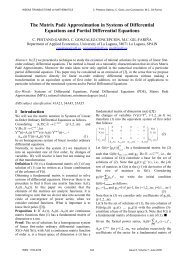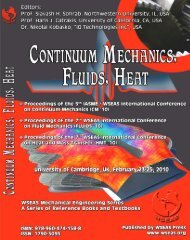Recent Researches in Artificial Intelligence, Knowledge ... - Wseas.us
Recent Researches in Artificial Intelligence, Knowledge ... - Wseas.us
Recent Researches in Artificial Intelligence, Knowledge ... - Wseas.us
You also want an ePaper? Increase the reach of your titles
YUMPU automatically turns print PDFs into web optimized ePapers that Google loves.
<strong>Recent</strong> <strong>Researches</strong> <strong>in</strong> <strong>Artificial</strong> <strong>Intelligence</strong>, <strong>Knowledge</strong> Eng<strong>in</strong>eer<strong>in</strong>g and Data Bases<br />
Plenary Lecture 1<br />
Aggregation <strong>in</strong> Intelligent Systems<br />
Professor Imre J. Rudas<br />
Rector<br />
Obuda University, Hungary<br />
E-mail: rudas@uni-obuda.hu<br />
Abstract: The problem of aggregat<strong>in</strong>g <strong>in</strong>formation represented by fuzzy sets <strong>in</strong> a mean<strong>in</strong>gful way has been of central<br />
<strong>in</strong>terest s<strong>in</strong>ce the late 1970s. In most cases, the aggregation operators are def<strong>in</strong>ed on a pure axiomatic basis and are<br />
<strong>in</strong>terpreted either as logical connectives (such as t-norms and t-conorms) or as averag<strong>in</strong>g operators allow<strong>in</strong>g a<br />
compensation effect (such as the arithmetic mean).<br />
On the other hand, it can be observed by some empirical tests that the above-mentioned classes of operators differ<br />
from those ones that people <strong>us</strong>e <strong>in</strong> practice. Therefore, it is important to f<strong>in</strong>d operators that are, <strong>in</strong> a sense, mixtures<br />
of the previo<strong>us</strong> ones, and allow some degree of compensation.<br />
This talk summarizes the research results of the author and his co-workers that have been carried out <strong>in</strong> recent years<br />
on generalization of conventional aggregation operators. This <strong>in</strong>cludes, but is not limited to, the class of un<strong>in</strong>orms and<br />
nullnorms, absorb<strong>in</strong>g norms, distance- and entropy-based operators, quasi-conjunctions and nonstrict means.<br />
Brief Biography of the Speaker: Imre J. Rudas graduated from Banki Donat Polytechnic, Budapest <strong>in</strong> 1971,<br />
received the Master Degree <strong>in</strong> Mathematics from the Eotvos Lorand University, Budapest, the Ph.D. <strong>in</strong> Robotics from<br />
the Hungarian Academy of Sciences <strong>in</strong> 1987, while the Doctor of Science degree from the Hungarian Academy of<br />
Sciences <strong>in</strong> 2004. He received his first Doctor Honoris Ca<strong>us</strong>a degree from the Technical University of Kosice,<br />
Slovakia and the second one from “Polytechnica” University of Timisoara, Romania.<br />
He is active as a full university professor. He served as the Rector of Budapest Tech from Aug<strong>us</strong>t 1, 2003 for a period<br />
of four years, and was reelected for three years <strong>in</strong> 2007. From 2010 Budapest Tech is changed to Obuda University<br />
and he was elected as the rector for five years.<br />
He is a Fellow of IEEE, Senior Adm<strong>in</strong>istrative Committee member of IEEE Ind<strong>us</strong>trial Electronics Society, member of<br />
Board of Governors of IEEE SMC Society, Chair of IEEE Hungary Section and Vice-President of the Hungarian<br />
Academy of Eng<strong>in</strong>eer<strong>in</strong>g.<br />
He is the treasurer of IFSA (International Fuzzy System Association), he had been the President of Hungarian Fuzzy<br />
Association for ten years.<br />
He serves as an associate editor of some scientific journals, <strong>in</strong>clud<strong>in</strong>g IEEE Transactions on Ind<strong>us</strong>trial Electronics,<br />
member of editorial board of Journal of Advanced Computational <strong>Intelligence</strong>, member of vario<strong>us</strong> national and<br />
<strong>in</strong>ternational scientific committees. He is the founder of the IEEE International Conference Series on Intelligent<br />
Eng<strong>in</strong>eer<strong>in</strong>g Systems (INES) and IEEE International Conference on Computational Cybernetics (ICCC), and some<br />
<strong>in</strong>ternational symposia. He has served as General Chairman and Program Chairman of numero<strong>us</strong> scientific<br />
<strong>in</strong>ternational conferences.<br />
His present areas of research activity are Computational Cybernetics, Robotics with special emphasis on Robot<br />
Control, Soft Comput<strong>in</strong>g, Computed-aided Process Plann<strong>in</strong>g, Fuzzy Control and Fuzzy Sets. He has published<br />
books, more than 450 papers <strong>in</strong> books, vario<strong>us</strong> scientific journals and <strong>in</strong>ternational conference proceed<strong>in</strong>gs. He<br />
received more than 600 citations for his publications.<br />
ISBN: 978-960-474-273-8 14


